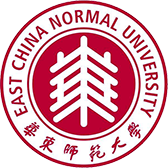School Badge

About East China Normal University
Founded in Shanghai in October 1951, East China Normal University (ECNU) is one of the most prestigious universities in China sponsored by the national top university construction programs “Project 211” and “Project 985”. In 2017, ECNU was chosen as one of the 36 Class A universities on the list of Double First Class University Plan released by the central government of China.With two beautiful campuses located in Minhang and Putuo districts of Shanghai, and covering a total area of more than 207 hectares, ECNU has long been known as a Garden University.
Since China opened up to the outside world in 1978, ECNU has developed rapidly into a comprehensive research university. At present, the University has 4 faculties, 30 full-time schools, 4 colleges, 8 advanced research institutes, one college of further education, and one national training center for secondary principals. Its 58 departments offer a total of 84 undergraduate programs in humanities, education, science, engineering, economics, management, philosophy, psychology, law, history and art. In addition, the University also offers 30 doctoral programs, 36 master’s programs, one professional doctoral program, 21 professional master’s programs, and 26 post-doctoral mobile research stations.
As of May 2022, the university has 31 primary disciplines authorized for doctoral degrees, 35 primary disciplines authorized for master’s degrees, 3 secondary disciplines authorized for master’s degrees, 22 professional master’s degrees and doctoral degrees in education, 26 postdoctoral research stations, and 85 undergraduate majors. There are 3 national “double first-class” disciplines, 2 national key disciplines, 5 national secondary key disciplines, 5 national key cultivation disciplines, 12 A-class disciplines in the fourth round of discipline evaluation by the Ministry of Education, 6 Shanghai peak disciplines (2 in Class I, 2 in Class II and 2 in Class IV), 12 Shanghai key disciplines and 17 first-class disciplines in Shanghai (4 in Category A and 13 in Category B). The University has 4,418 teaching staff, of which 2,412 are full-time teachers. There are 2,089 professors and other teachers with senior titles, including 19 academicians (including double-appointed academicians) of the Chinese Academy of Sciences and the Chinese Academy of Engineering, and 443 candidates selected for various national and Shanghai talent programmes. There are 15,914 full-time undergraduate students, 3,952 doctoral students and 17,719 master’s students, and 1,551 international students (academic students). The University’s main campuses are Minhang Campus (500 Dongchuan Road, Shanghai) and Zhongshan North Road Campus (3663 Zhongshan North Road, Shanghai), covering a total area of approximately 207 hectares.
The University has 2 State Key Laboratories, 1 National Engineering and Technology Research Centre, 1 National Field Scientific Observation Station, 1 National Joint Research Centre, 7 Key Laboratories and Engineering Research Centres of the Ministry of Education, 1 Joint Laboratory for International Cooperation of the Ministry of Education, 1 Strategic Research Base and Soft Science Research Base of the Ministry of Education, 1 Field Scientific Observation Station of the Ministry of Education, 1 Research Centre of the Ministry of Civil Affairs, 1 Research Centre of the Ministry of Education, 1 Research Centre of the Ministry of Civil Affairs, 1 Research Centre of the Ministry of Education. 1 research centre of the Ministry of Civil Affairs, 1 key laboratory of the State Press and Publication Administration, 2 key laboratories and engineering technology innovation centres of the Ministry of Natural Resources, 12 key laboratories and engineering technology research centres of Shanghai, 1 engineering research centre of Shanghai, 1 field scientific observation research station of Shanghai, 1 soft science research base of Shanghai, 1 collaborative innovation centre of Shanghai, 2 frontier science research bases of Shanghai. The university has 6 key research bases of humanities and social sciences of the Ministry of Education, 1 laboratory of philosophy and social sciences of the Ministry of Education (incubation), 1 national key research base for the construction of teaching materials, 6 country and regional research centres of the Ministry of Education, 2 national experimental bases for intelligent social governance, 1 national base for the transmission of excellent Chinese traditional culture in general universities, 1 base for scientific research on ageing of the China Association of Ageing, 7 innovative research bases of philosophy and social sciences of Shanghai. Shanghai Philosophy and Social Science Innovation Research Base, 6 Shanghai Municipal People’s Government Decision-making and Consulting Research Base Workshops, 4 Shanghai University Think Tanks, 10 Shanghai University Key Research Bases of Humanities and Social Sciences for “Establishing Moral Education”, and 1 Shanghai University Base of Excellent Chinese Traditional Culture. There are now 10 bases of the Basic Discipline Top Students Training Program 2.0, 2 national experimental teaching demonstration centres, 1 national virtual simulation experimental teaching centre and 9 Shanghai experimental teaching demonstration centres. The university hosts, hosts and co-hosts 23 Chinese journals and 7 English journals, and the libraries on both campuses have a total physical collection of over 4,938,600 volumes and 164 electronic literature databases (466 sub-databases). The university actively serves and integrates with national strategies. The Education Group has taken “excellence” as its leader in building model schools and districts for basic education, and now has 58 primary and secondary schools and kindergartens (officially enrolled and operating) affiliated to it. The school also insists on the separation of management and administration, explores the cultivation of high-quality non-academic education programmes, focuses on promoting connotative development, and enhances social and economic effectiveness in an integrated manner.







